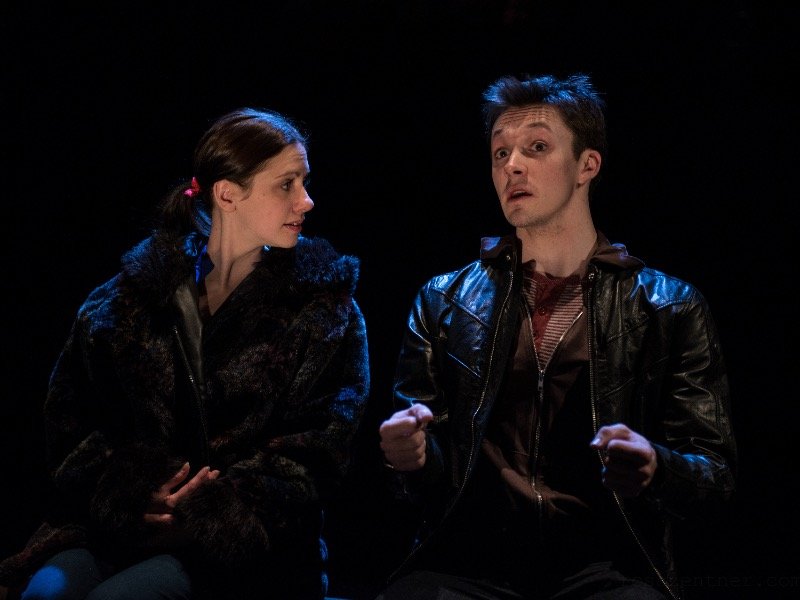Renaissance Theaterworks’ current production of "Russian Transport," which opened Saturday night, is full of the cultural touchstones one would expect from a family drama focusing on recent immigrants from the former Soviet Union.
There are pierogis for dinner and exuberant toasts with vodka. The KGB and life under former Russian President Yeltsin are mentioned in conversations. The newest arrival to the U.S. brings a matryoshka doll, a traditional set of nesting wooden figures, to his teenage cousin as a gift from the old country.
There is a concern that the younger members of the family are forgetting their language and their heritage. And above all, there is a palpable desperation to find a better life than the one they all left – a hardscrabble pursuit of the American dream.
If that’s all there was to Erika Sheffer’s debut play, it would be a pleasant story of the immigrant experience – a subject that is certainly fraught in the current political moment. But instead, like the traditional matryoshka doll, there are many, many nuanced layers to this riveting story, focusing on the compromises each person makes in pursuit of success – or even just a comfortable existence in his adopted country.
Each new layer brings more complexity, more moral gray areas and higher stakes as dire financial difficulties test the bonds of family and the limits of every character’s integrity.
"Russian Transport" could have been written as a companion piece to Arthur Miller’s "A View from the Bridge," which has enjoyed renewed interest through productions at American Players Theatre last season and the much touted Ivo Van Hove version which played at Chicago’s Goodman Theatre in the fall. In both stories, an immigrant family that has gotten a toe-hold in the land of opportunity makes arrangements for more relatives to immigrate in search of a better life. But as the old and new worlds collide, conflicts within the family threaten to destroy them all.
Here the coarse, tough-as-nails Diana (Elizabeth Ledo) welcomes her handsome, mysterious younger brother Boris (Mark Puchinsky) into her Brooklyn home, where money is tight but family is tighter. Diana’s affable husband Misha (Reese Madigan) is thrilled to receive a bottle of vodka from his brother-in-law, but extremely uneasy about the imposing man’s presence near his children. The thoroughly American teen Alex (Max Pink) and his younger sister Mira (April Paul) are initially more inconvenienced by their uncle’s appearance than happy to welcome a distant relative.
As the play progresses, the happy reunion fades and the cracks begin to show on the family’s increasingly strained relationships. When Boris offers Max a side job to pick up some people at the airport and deliver them to a location in New Jersey, it’s hard for him to say no to the money. Turns out he’s already working for the family car service, selling phones at a Verizon store and dealing a little pot in order to help with the mortgage and have a little left over to spend on cool clothes.
Like most deals that sound too good to be true, Alex is soon in over his head – at odds with his father, threatened by his uncle and wrestling with his conscience about his culpability in delivering young Russian girls to a life of prostitution, or worse.
In a uniformly strong cast, Max Pink stands out as the teenage son trapped in a no-win situation with potentially lethal consequences. The play hinges on his struggle to please his parents, disentangle himself from his uncle’s sex trafficking scheme, protect his sister and somehow assert his independence. As the conflicted and genuinely compassionate young man caught at an impossible cross-roads, he’s simply brilliant.
Playing four distinct roles, April Paul is also excellent here. The actress, who turned in a stunning performance last season in RTW’s "Luna Gale," perfectly embodies Mira’s awkward self-consciousness – a 14-year-old girl on the cusp of physical and emotional maturity. The innocent in the house who is both fascinated and repulsed by her uncle’s presence, she is the last to understand, and perhaps be consumed by, the family businesses.
Then Paul changes character in full view of the audience, adding costume pieces and altering her hair to transform from the dorky, bespectacled American to three different Russian girls, being shuttled in Alex’s car. Lured to America by the promise of modeling jobs and stripped of their passports, each girl confides her nervousness, her hopes for a new life and her painful naiveté to Alex as he delivers her to her fate. With subtle changes, Paul creates entirely different women who will all suffer the same fate.
Finally, as the progressively more menacing uncle Boris, Mark Puchinsky blends just the right amount of charm and ruthlessness in his portrayal of the street savvy and ambitious Russian thug. Even just changing his shirt onstage several times, allowing the audience to glimpse a broad chest and muscular arms that could easily overpower anyone in the house, adds to his intimidating presence. And as the son of Soviet immigrants, it’s no surprise that Pulchinsky’s accent is impeccable.
Speaking of language, both the cast and script itself deserve high praise for so seamlessly incorporating Russian into almost every scene. It’s a fascinating device that allows understanding between some and the exclusion of others – although truthfully, there were no moments of the play that were difficult for the audience to grasp emotionally.
In a play that could veer into stereotype easily, director Laura Gordon shows masterful control. She steadily ramps up the tension of the piece while ensuring that each character has moments of humor, vulnerability, raw anger and heart-wrenching honesty. Her tableau that ends the play is especially brilliant and poignant, leaving no easy answers for the characters or the audience.







